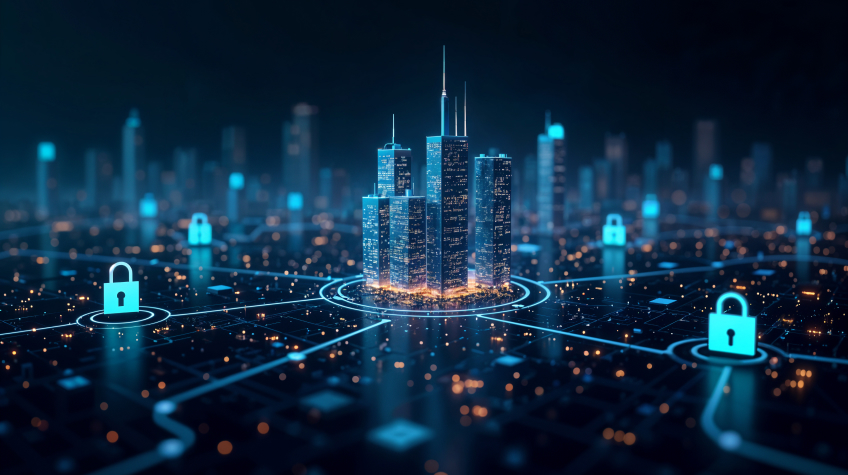
Cybersecurity is important and its significance in today’s technologically advanced and fast-paced world cannot be emphasized enough. Moreover, the threat landscape has gotten more intricate and hazardous as societies depend more and more on digital infrastructure. All aspects, ranging from widespread personal devices to cloud-driven business systems, face cyber threats.
Cyberattacks are becoming common, sophisticated, and capable of causing enormous personal, political, and economic harm. They are no more isolated occurrences. Modern cyber threats are dynamic and constantly changing, and old cybersecurity approaches—while still fundamental—are not keeping up. This is where the transformative power of artificial intelligence (AI) comes into play.
AI has is capable enough to completely change how we think about AI In cybersecurity. AI gives businesses the ability to identify, anticipate, and react to cyberthreats with previously unheard-of speed, accuracy, and efficiency by utilizing machine learning algorithms, pattern recognition, behavioral analytics, and automation.
AI-driven solutions constantly learn and adapt, which makes them more resistant to new threats than traditional systems, which sometimes rely on static rule sets or predetermined signatures. This article explores artificial intelligence’s diverse applications in cybersecurity. Read on for detailed insights…
AI in Cybersecurity – What is it?
Artificial Intelligence in cybersecurity is the process of integrating sophisticated computational techniques into security tools, systems, and protocols. These techniques include machine learning (ML), deep learning and natural language processing (NLP). AI in cybersecurity enhances threat detection, mitigation, and response.
Unlike traditional cybersecurity measures, which frequently rely on manual monitoring, fixed rules, and reactive procedures, AI-driven solutions give digital defences a proactive and adaptable edge. Intelligent systems are capable of analysing large amounts of historical and real-time data and finding trends, identifying abnormalities, anticipating new dangers, and automatically taking preventative measures with little assistance from humans.
One of the key strengths of AI in cybersecurity lies in its ability to continuously learn and evolve. As cyber threats grow more sophisticated and attackers employ more advanced tactics, AI systems are uniquely positioned to keep pace.
They enable quicker and more precise identification of known and unknown attack vectors by adjusting to fresh data inputs, changing threat landscapes, and behavioural trends. Instead of only reacting after harm has been done, this dynamic capability guarantees that businesses can remain ahead of threats.
The Need for AI in Cybersecurity
Organizations that us AI in cybersecurity greatly enhance their systems. Unlike traditional security systems, AI-driven security systems are more powerful and sophisticated. They make it easier to identify known and undiscovered attack routes more quickly and accurately.
Compared to conventional rule-based methods, these intelligent systems are more responsive and efficient. This is because they are constantly adapting to new data inputs, changing threat environments, and changing behavioural patterns. Their dynamic nature helps them to identify even small signals of malicious activity that static systems may overlook.
AI can examine massive amounts of data in real time. It can help spot trends and irregularities that can point to possible dangers, which usually go unnoticed by human analysts. These systems do not depend on human oversight or preset standards. As a result, this shortens the time between discovery and reaction.
They assist in identifying and addressing the risks way too early than they even occur. This enables companies to predict, avoid, and respond to cyber disasters proactively rather than merely responding after harm has been done.
This ability to stay ahead of attackers not only improves an organization’s overall security posture but also ensures business continuity and protects sensitive data.
As cyber threats become more complex and frequent, AI’s role in ensuring a resilient and adaptive cybersecurity infrastructure becomes not just beneficial, but essential. Here is why the need for AI becomes inevitable
1. Large Volume of Data: Modern networks are producing large volumes of data. Examining such enormous data using traditional tools is next to impossible. And that’s when AI come in handy. AI helps process enormous datasets. It does in a matter of seconds and instantly highlights possible dangers that could otherwise go overlooked.
2. Evolving Threat Landscape: With advancements in technology cyber crooks are also becoming smart. They utilize advanced technology to create complex attack techniques, like polymorphic malware and zero-day exploits. AI-driven security systems are designed in such a way that they can change and grow in reaction to these new dangers.
3. Shortage of Skilled Professionals: This is one of the most important reasons organizations need to implement AI in cybersecurity. Whether you believe it or not, there is a severe skills shortage in the cybersecurity sector. And that’s when AI comes in handy. It fills this gap by automating a lot of complicated and common security activities.
4. Real-Time Response Needs: Cyber attackers can inflict significant harm to an organization. Any threat that goes unnoticed or unaddressed can potentially cause severe damage to an organization. Thanks to AI, it significantly reduces potential harm by facilitating instantaneous event identification and containment.
Let’s now take a look at the key roles of Artificial Intelligence in cybersecurity in this section. Here we go…
What is the Role of AI in Cybersecurity
Here are the different ways AI turn out to be essential in cybersecurity. Take a look…
1. Timely Threat Detection and Prevention
AI-driven cybersecurity systems help organizations with timely threat detection and prevention. It is capable of spotting trends in data that suggest malicious acts. Large datasets, such as known malware signatures, attack patterns, and traffic anomalies, are used to train these systems. Even if the precise attack method is unknown, they can identify threats in real time once they have been trained.
2. Security Automation
AI helps in security automation. AI automates routine security tasks like patch management, network monitoring, and log analysis. Automation not only increases productivity, but it also lowers the possibility of human error, which is a major contributor to data breaches.
3. Incident Response
Here is another important role of AI in cybersecurity. AI can automatically plan and carry out workflows for incident response. The AI system can identify the optimal line of action, like as banning an IP address, isolating a device, or alerting the IT staff, by assessing the type of attack.
4. Vulnerability Management
AI also help with vulnerability management. It assists businesses in locating system flaws before they can be taken advantage of. In order to facilitate quicker and more efficient remediation, it reads code, examines software configurations, and ranks problems according to possible danger.
5. Behavioral Analytics
Lastly, AI helps with behavioral analysis. AI-powered systems create baselines for typical system and user activities. The system raises alerts or takes preventive action when deviations happen. For instance, if an employee logs in from an odd location or accesses critical data at odd hours it will raise alert.
So, what are the benefits of AI in cybersecurity. Read ahead for the benefits…
Key Benefits of AI in Cybersecurity
Here are some of the benefits of Artificial Intelligence in cybersecurity. Take a look…
1. Enhanced Accuracy and Speed
AI is one of the most advanced tools available today. It is able to evaluate data at a scale and pace that human analysts cannot match. AI-driven security systems offer enhanced accuracy and speed. This in turn, significantly reduces the window of opportunity for attackers, allowing for quicker detection and response times.
2. Cost Efficiency
Cost efficiency is one of the significant benefits of utilizing AI in cybersecurity. Yes, AI lowers operating expenses. It does it by automating numerous cybersecurity tasks, which eliminates the need for sizable security staff teams. Aside from that, it also reduces the monetary losses brought on by system outages and data breaches.
3. Continuous Learning and Adaptation
AI comes in handy when it comes to continuously evolve. As machine learning models are exposed to new data, they get better over time. AI systems are guaranteed to improve in accuracy and efficiency in identifying and reacting to threats because of their ongoing learning process.
4. Reduced False Positives
Not every alarm or alert can be positive. However, for human analysts it is very difficult to figure out whether the alarm is false or positive, at least at the speed at which AI can do it. Security teams often find themselves stuck with false positives from traditional security technologies. But that’s not the case with AI systems. AI systems significantly reduce false warnings and concentrate on real risks.
5. Proactive Defense
Last but not least, AI offers proactive defense by anticipating threats rather than merely responding to them. Artificial intelligence (AI) technologies can predict possible threats and assist organizations in putting preventive measures in place by examining patterns and behaviors very well in advance.
Challenges and Limitations of AI in Cyber Security
Undoubtedly, AI offers numerous advantages, which makes it pretty desirable in cybersecurity. However, there are certain challenges and limitations of AI in cybersecurity, which we believe you should be aware of. Here are significant challenges and limitations of Cybersecurity. Take a look…
- Data Dependency: As you know that AI systems rely on large data based on which they improve their performance over time. This means that AI systems need a large amount of high-quality datasets to work well. Incomplete or biased datasets can lead to inaccurate threat detection.
- Adversarial Attacks: Cybercriminals are becoming smarter with advancements in technology. They are coming up with new and unique ways to tamper with AI algorithms. This causes the system to make poor conclusions and inaccurate threat detection.
- Higher Implementation Costs: Know that AI solutions are expensive to develop and implement. Investing such an enormous amount for cybersecurity may not be possible for small and mid-sized businesses.
- Black Box Problem: Many AI models operate as ‘black boxes,’ making it difficult to comprehend how judgments are made. Accountability and trust may be hampered by this lack of transparency.
- Over-Reliance: Lastly, more and more businesses are now using AI for most of their business operations. This significantly increases their reliance on AI systems, leading to inadequate strategic planning and absence of human control.
Emerging Trends of AI in Cyber Security
The future of AI in cybersecurity is full of promise. Here are some key trends to watch:
- Predictive Threat Intelligence: PTI uses data analysis and machine learning to anticipate future cyberattacks. It does it by identifying patterns in historical data and emerging trends. It is a proactive approach to cybersecurity, focussing on thwarting attacks prior to their onset.
- AI in Cloud Security: As more and more businesses are now migrating to the cloud AI can play an important role here. It can be used for protecting both cloud services and infrastructure.
- Natural Language Processing for Threat Analysis: NLP tools can help find new dangers by examining social media, threat reports, and conversation on the dark web.
- Deepfake and Misinformation Detection: Artificial Intelligence can play a significant role to detecting distorted media and defending against information warfare.
- Integration with Quantum Computing: AI can also be integrated with Quantum Computing to leverage the strengths of both technologies. AI systems will be able to combat dangers allowed by quantum technology very well in advance.
- AI-Powered Identity and Access Management: Identity and Access Management powered by artificial intelligence will enhance security and help organizations to effectively manage digital identities and control access to resources. Using AI-powered identity and access management organizations can adapt to dynamic security environments
- Federated Learning for Privacy: Last but not least, is Federated Learning offers ways to protect users’ data privacy. It addresses a rising cybersecurity risk by enabling AI models to train across decentralized data sources without jeopardizing user privacy.
The Bottom Line
So, this is all about the role of Artificial Intelligence in cybersecurity. Hopefully, this article has been informative for you and helped you understand how AI can help enhance your cybersecurity. AI has redefined organizations’ approaches to cybersecurity and has become a vital tool. It not only prevents organizations from cyber threats but also help them automate security tasks and save a lot of money, effort, and time.
Because of its capacity to analyze enormous volumes of data, adjust to emerging threats, and automate intricate procedures, more and more organizations are now opting for AI in cybersecurity.
While concerns like data quality, transparency, and hostile manipulation persist, continual developments in AI research and development are paving the road for more resilient, intelligent, and proactive security systems. Our defenses must change along with cyber threats. AI’s incorporation into cybersecurity is not merely a fad; rather, it is a necessary development to protect our digital future.
Thanks for reading! Stay tuned for more such insightful articles! Contact us Today!






